Ruben Montesco, one of the key names to get to know Madrid nightlife, has managed to combine his work behind the desk with the production of tunes that sounded in half of the world. Now, with his label Industrias Mekanikas, he’s publishing some of the best records of electronic music of the moment. We bring you the first part of this extensive interview, where we speak about the career of this DJ and producer slave of the darkness.
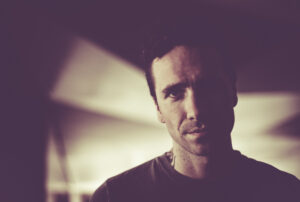
—Your musical beginnings as a bass player were in a nu metal band. How did you evolve towards EBM and industrial? Do you think it’s a pretty common evolution?
—The evolution has been curious. I’ve always been a metalhead. From a very young age, I was a metalhead with tight pants and listened to Twister Sister, Motorhead, Whitesnake and Kiss. I was very curious and listened to the radio a lot. While I was searching through metal shows and programs, there was always one about electronica or trendy music. And so, I started listening to other bands. I remember that one of the groups that had the biggest impact on me at the time was Depeche Mode. It was something that had nothing to do with what I was listening to, but they said practically the same thing, with other kinds of instruments. I started collecting this kind of music. When I got more into electronic music, I discovered bands like Ministry, Front Line Assembly, so I realized that electronic music and metal were not incompatible. When you are a kid you are told that that you have to be a metalhead, and you don’t have to use electronic elements, not even keyboards. And then you realize that many things do fit in. It was an evolution, while I was playing bass, I started to get some machines, I got a sampler, a 303. The big difference is that with the bass you would put together a band, you would go and play… You needed three or four people to do something, while with electronics, with a drum machine and a sampler you could put together your own songs, which is what I was doing at that time. And that is where the evolution came from, I went from playing bass, to getting much more into electronic music and I started to collaborate with many more people, I made my own music. It is also true that the band we put together, which was called Morgue, didn’t get famous. Maybe if it had been successful, I would have continued playing bass. The band was more into black metal, hardcore. The nu metal sound was added later. Little by little we added the machines. But at the beginning it was totally dark. I was the bass player and also the singer.
—Do you remember which Depeche Mode album was the one that made the biggest impact on you?
-One of the ones that impacted me the most was Violator. I thought the programming was brutal, I analized the songs…. I thought that album was tremendous. Then many others. I also started listening to Ministry, not the first albums when they were more neo-romantic but when they started to get a bit darker. Front Line Assembly, Godflesh. I started listening to some really hard stuff and I said to myself, this is really fulfilling for me. And it wasn’t just me that started to change. Also, my group. When you start flirting with these kinds of sounds, you open a wide range.
—Do you think it’s a pretty common evolution?
—I see it in a lot of people. In fact, a lot of people who come from metal go on to be big electronic producers. You have a lot of examples. From Justin from Godflesh to Sepultura’s drummer, Igor Cavalera who is a pretty famous guy. A lot of artists I know who come from metal have ended up in electronica. Then, I listened to people like Front 242 or Nitzer Ebb, and they blew my mind with those industrial beats. That’s where I found what I wanted to do. That industrial stuff is very archaic. I’m really into that kind of rhythm. It was like my nexus of connection. But I always remember that I was part of a band. Anyone who has ever played has that longing to have a band and play together. It’s another thing. But well, our heart is divided.
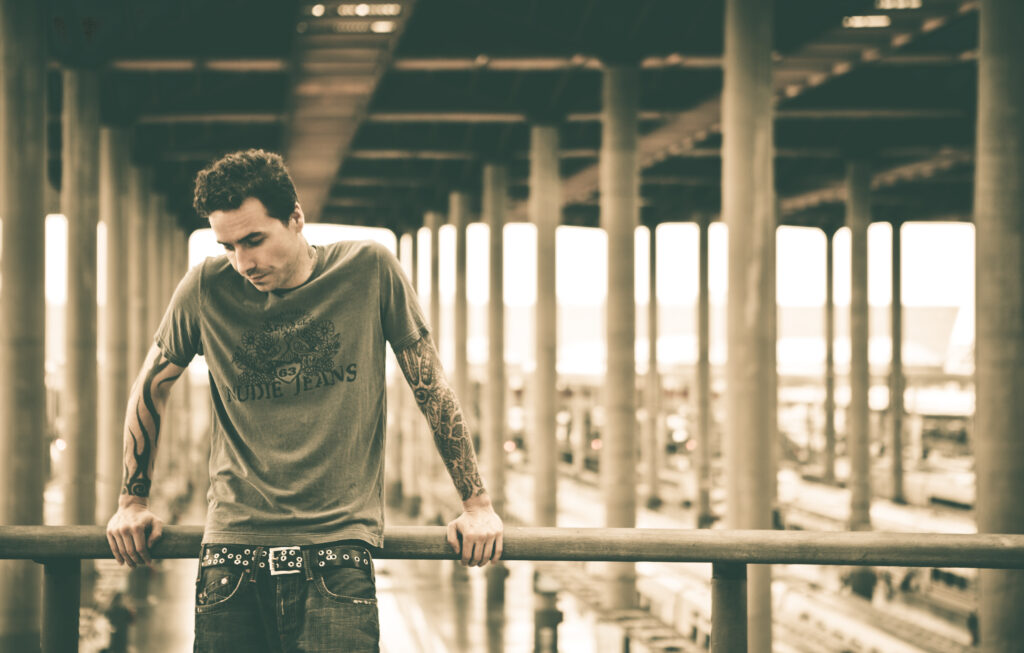 —When did you start DJing?
—When did you start DJing?
—I started DJing because there was a pub under my place and well, I had a colleague who played there and, of course, as I was a record collector, he invited me to play with him. It is also true that in my home since I was very young it was very common to buy vinyls. In fact, part of my collection is inherited from my father and my mother. And I used to buy records. I used to play with some very old wooden turntables that had the pitch in a circle. At the beginning I played with a turntable and a tape recorder. Then with time I was given another turntable. I was the typical one that always recorded all the programs, and I would go to my friends’ homes when we would meet up with a tape to play music. It’s something that is intrinsic to you. Music has always played an important part in my life. I used to play rock bands, but I didn’t have the criteria of being a DJ. This colleague from the pub would sometimes call me to play some records with him and I used to go. He told me I was good at it. Then when you have two turntables, you have a blast. And that’s when the passion for playing music started.
—When did you start DJing professionally?
—Professionally, very shortly, everything took off. I was going down to the pub to play music with my colleague, then another pub called me, or another bar in Getafe asked: “Hey, do you want to come and play some records? So, I was playing records and later people started saying: ‘Hey, there’s such and such a place in Madrid, come here.’ I started to play in Alcorcón too, in the whole southern Madrid area. I started making a name for myself in the sector. In those days, I was playing a more up-tempo music. In fact, there was a club here in Madrid called El Plug which was that kind of session, as was the Baihai in its day. We started to play rap metal, a bit of fusion, industrial, metal with electronics. The sessions were really cool because they evolved a lot. We played a lot at Descolocado in Alcorcón. Those were places where the sessions were not like the ones nowadays that are only electronic. It was a bit like the other day at Bizarro, where you could play a bit of everything. I even played Brujeria with very experimental stuff. Then, it’s true that at the end of the nineties I had nowhere to play, because the kind of music I played, which was industrial or more EBM, was no longer popular. So of course, when house music became popular here in Madrid, that was completely out of the question. I also played in a place called El Champaud, on Velarde street, where we did that kind of sessions. People still remind me of those days. I’m talking about the early nineties.
—From that time of house music in Madrid is your Latinlingou session, right? Was it recorded for a club?
—It’s a record I recorded for a club in Madrid, in Rivas, where Fabrik was. It’s like very deep house, like dark house from the San Francisco scene, since we recorded it at that time. It’s the softest version of what I’ve done that still travels the worlds of electronics. It’s half electro, half dark. It’s a curious session.
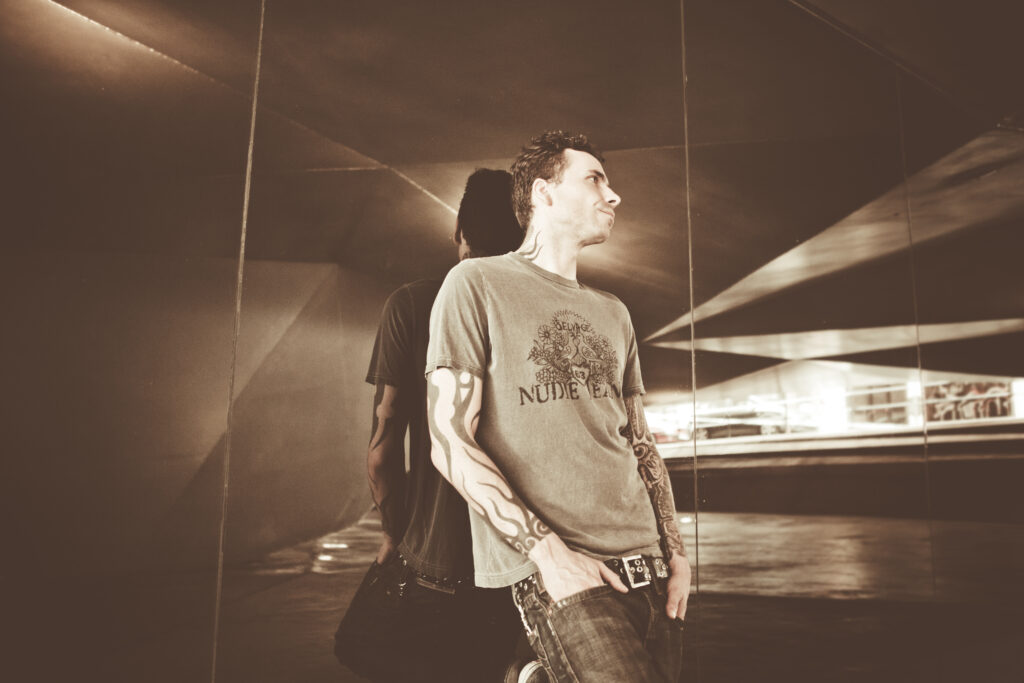 —In your biography, you highlight your time playing at Coppelia 101. What memories do you have of that time and other venues like Long Play where you also played?
—In your biography, you highlight your time playing at Coppelia 101. What memories do you have of that time and other venues like Long Play where you also played?
—It was like re-entering the circuit because I hadn’t played for a long time. I was a bit out of the game. The sounds I played were very far from what was being played. That’s why those first sessions I was telling you about were within the range of house, I was trying to fit in. But even so, my sound was still dark, hard. That’s from where I come. Miguel Mendoza, whom I have known for many years, was one of the residents at Long Play when I started working there. I was working at the door with the guest list. I had rented the record store in what was formerly Intergroove. I was one of the associates. Until the store started working, I had to earn some money. That was the way to stay in the circuit. I worked with Isidro, another classic of the Madrid scene. Then when we finished working, there was always someone who suggested that we could go to a house to party and there I started to play records again. And people would say that the music was great. And Miguel told me that I had to go back to DJing. Yes, but I always asked where you could play this kind of music. It was Miguel who opened Coppelia for me back in the day, or rather 101, which was an after-hours club that opened there in the old Revolver club. That’s where I got into it again. Miguel opted again for this kind of sound, leaving aside the House music that was very present in Madrid at that time, in the early 2000s and opted again for a darker movement, more EBM, darker techno. Then came the electroclash, and I had also played a lot of electro, so everything came smoothly and I found my place again and since then everything went forward.
—How did the public receive those more eclectic sessions?
—Very well, they have always been very well received. One thing that we have always defended a lot is that the more eclectic the sessions are, the more enjoyable they become. Going from being something more routinary, something that is also cool, of course, like listening to a techno-only session. I personally don’t like it much, but I can understand that you can enjoy three hours of trance in a mantra. After all, techno is a very cyclical thing, there are loops that repeat almost all the time with very developed revolutions and so on. But personally, I like more eclectic sessions, where you can play more with the styles, play with the intensity, with the strength, with the rhythms. I’ve always liked broken rhythms and techno has them from time to time because there is a lot of techno with a broken base, but it’s not what I am looking for.
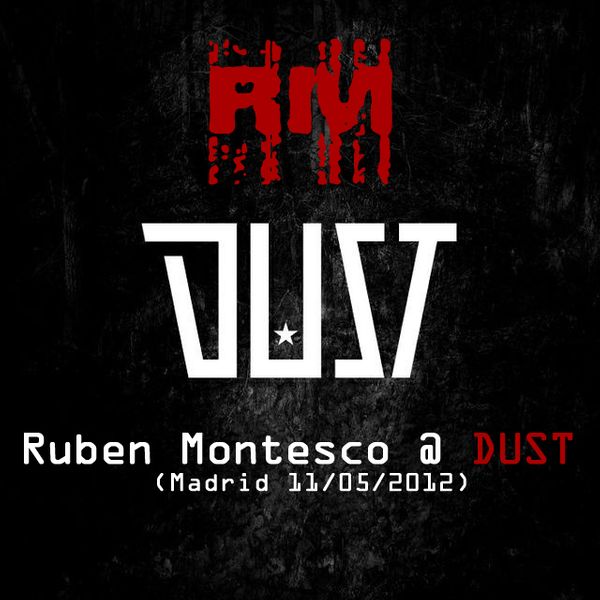 —Where have you felt most comfortable DJing?
—Where have you felt most comfortable DJing?
—I think it would be at the Stardust. I have been a resident at the Stardust for many years of my life and it is where I have been able to develop as a DJ in all my facets. There, I had complete freedom, plus everything we experimented was well received by the people. I remember some days of leaving almost crying from the emotion of the public’s response that you can’t even imagine. There are photos of the audience, a thousand people all standing there with their hands up. It was crazy. If you ask me for a place, I would say Stardust. There have been moments in some sessions, or when I’ve played in Detroit… But they are different things, you go as a guest, it’s an experience. As a day job, being the resident of a venue, it’s something different. As DJ, people need you, and you also need them. It’s a quid pro quo, you give me, I give you. Besides, I’m a DJ that you can notice that enjoys it. It was a good time.
—How did it happen that you play in Detroit?
—It was an incredible experience for me. I never thought I would go there to DJ, but in 2004, I released a reference on Lasergun, Savas Pascalidi’s label. What that record did was to put me in the international scene because it was a big success. It sold about 1800 copies, a huge amount and it was played from Sven Vath in Ibiza to Villalobos. It was played everywhere. I was lucky because Savas Pascalidis was a friend of DJ Hell and worked with the same bookers. I played a lot at that time and I had the opportunity to travel to many places and one of them was the Fuse-in in Detroit, it was one of the top places where I played. I was there for three or four days. It was the most awesome, the festival. I met a lot of artists, it was an eclectic festival, there was hip hop and rap, electronic, techno and a lot of electro. The day I played there was Model 500 in the tent next door doing a live set. It was an event for 50,000 people. It was incredible. It was in 2005–2006.
—In 2019, you played at the famous Tresor nightclub in Berlin, how was the experience?
—Tresor was incredible as well. It was great. I had a great time. It was a place I really wanted to go and play. It’s one of the top places we have in Europe. It’s a bunker that has an incredible sound. The people are there, touching the fence. It was intense. I would have liked to play more, I would have liked to play for six hours. It was short, but it was impressive, yes.
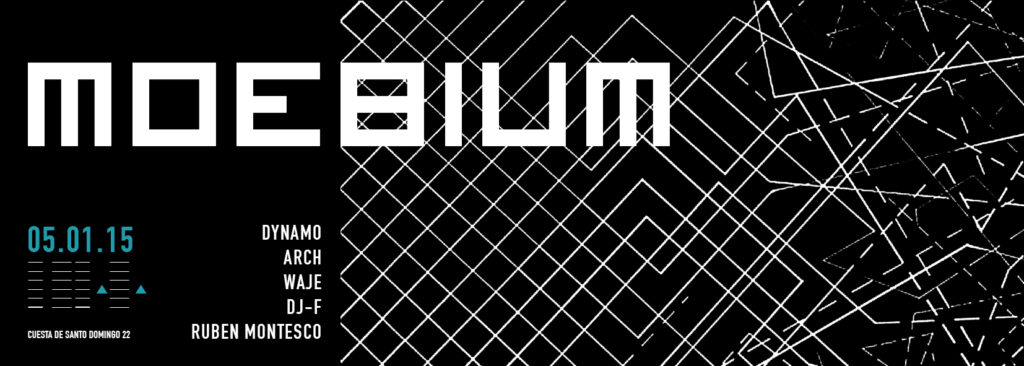 —In 2015 you started the Moebium session with Waje and DjF. Is it difficult to organize a party in Madrid?
—In 2015 you started the Moebium session with Waje and DjF. Is it difficult to organize a party in Madrid?
—Yes, especially when you are not a promoter. The venues or the people who are dedicated to organize events have been disappearing or it’s been the DJs who have taken on that role, which is a problem. I’m not a promoter. I don’t have that capacity. I know how to play music and make music. But putting on a party is very complex. You need to have a series of contacts to get people to go. You must dedicate a lot of time because the job of a promoter is an important job. It is a person who must know the night, who must know the public, who must move people. Those who know me know that I have a reputation for being a bit shy, a bit introverted and I do not have that facility with words to be chatting all the time with people. I’m an introverted person who doesn’t talk much and talks to people about music. I don’t have that ability to be like ‘hello, how are you,’ to write messages… I hate social networks, it’s hard for me to write a WhatsApp, it’s hard for me to write a message. It’s not a tool that I feel comfortable using to organize events. What did we do? Well, we put three people together to try to do between the three of us what one person does. But we could not do even that. We have had some occasions in which the parties have gone well, others in which they have gone regular and others in which they have not gone so well. Nowadays everybody has tried to organize a party because unfortunately there is a lack of good promoters who are not looking for a DJ to fill the dancefloor or to do the promotion work. If not that they bet on the music that the DJ plays and the promoter’s job is done by him. We have this need to keep performing, to keep playing, especially for the public.
—Did you have problems with competitors?
—You know that in Madrid… Everywhere there’s something going on and when you set up a session and there’s another promoter doing something similar there’s always a little friction. But nothing remarkable. Luckily, we are appreciated in Madrid, for the good and for the bad. We don’t move big crowds; we are not mega known but we don’t have a bad reputation either. We are humble and honest people.
—What is essential in your set?
—Broken base, always. There always has to be a broken beat. I like to make the break. I like to make rhythm changes, always. Some EBM, some hard bass. Darkness is always there, I guarantee you that. But whether it’s House, whether it’s acid, whether it’s electro, whether it’s experimental or even ambient music, I always go dark. I always look for the dark, that’s why my first album is called ‘Slave of the Darkness.’
—Besides being a DJ, you are also a producer. What kind of material do you use when composing a track? Are you more into analogue or digital?
—My studio is almost 90% analogue. Most of the gear I work with is analogue. Of course, you always have something digital but mainly, my music is made with machines. That doesn’t mean that I don’t take my laptop with me when I travel or go on vacation, so I can make a sketch. And then I take that sketch to the machines.
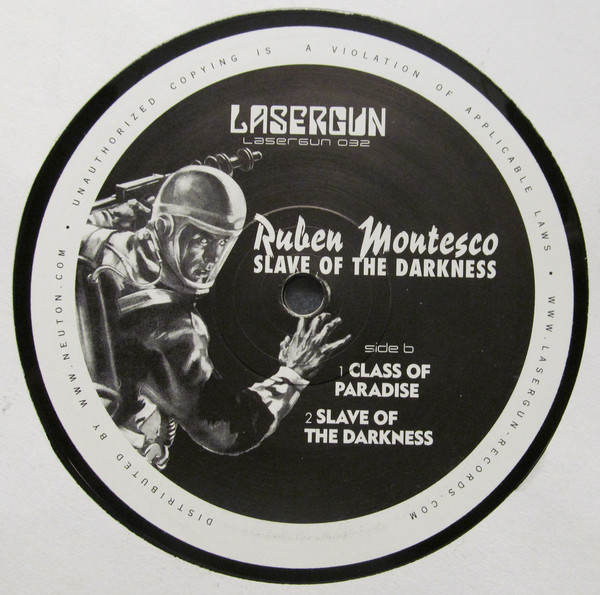 —In 2005 you released your first 12″, titled Slave of the darkness with a German label. What pushed you to produce it?
—In 2005 you released your first 12″, titled Slave of the darkness with a German label. What pushed you to produce it?
—Creativity, the need to say something. I mean, I had a lot of music and I bought a lot of records and I said to myself, I’m going to make my own tracks.
—What influences did you have then?
—I started making music in 95–96. What I was doing at that time was very Nitzer Ebb, very Front 242, with industrial beats. Everything was harder. Then with time I started doing more and more different things. In fact, not long ago I put out a compilation of stuff made around that time that I thought might work. When I started producing, I was going for that EBM sound. In fact, I was always talking to a friend to get some guitar and do something more industrial. I also tried to play guitar to make my own riffs, but I’m not good at it.
—Before creating Industrias Mekanikas, you had another label, right?
—Yes, I had a label before I started Industrias Mekanikas which was the project I had in mind for many, many years. At the beginning, as you didn’t have the resources, nor I had a clear idea about what I was going to do or where I wanted to go, we set up some digital labels which were Actinium and Reactinium. There was the techno label and the more heterodox one which was Reactinium where there was a bit more of everything. The idea with Reactinium was to set up a hybrid label, both digital and analogue. What happened? At that time, starting a label was complex, there was not much economic capacity so we released the first references in digital to see if we could make some money. But with time I realized that if you want to bet on something, which is what I did later with Industrias Mekanikas, you have to bet on an idea from the beginning. I don’t regret it at all. In fact, in Reactinium until a few years ago we have continued releasing things, but it was just that, a digital label due to the impediment of not having the necessary funds to be able to release vinyls, which if we had had it, it would have been done. In fact, it was considered to make the first references in digital and then to press the vinyls. I set up the labels with a friend called Sergio Hervás and we had that idea. There were a lot of collaborations with international artists because we had connection with many artists. It was left on stand-by and then I launched my project Industrias Mekanicas.
—Do you think that you will publish this material on vinyl?

—In fact, I already published a song I initally published on digital in one of my Antikhrist releases.
—The label you just talked about, Actinium Records, was founded in Belgium. Could you explain this a bit to us?
—No, it’s just that we has a friend of Sergio who lived in Belgium. And you know how Spaniards are with music… so he said we should create the label there. The first contacts were made from there, as there was a boom in digital publishers. Although the label was run in Madrid, we kept it as Belgian. The last reference of Actinium was releassed when Industrias Mekanikas already existed.
—How have your tastes evolved? For example, in the 2012 EP, 9:33 All Or Nothing, we find a sound closer to electro.
—Yes, that’s what I’m telling you that album plays a bit with ambiguity, it has tracks with broken rhythms. My sessions are not of a single genre, neither are my productions. I do like there to be a variety within the album. In fact, in my second reference in Industrias Mekanicas, you can see it. I show my influences from the nineties, there is a new beat track, one more EBM, one more industrial techno. If there is something that has always characterized me, it has always been that, going from one side to another. I don’t like to pigeonhole myself, although people pigeonhole me. I like to make and play music of other styles.
—On the other hand, in your first full-length Without Transition, released in 2014, it seems that you want to give an outlet to all your influences. What can you tell us about the creative process of the album?
—Indeed, I did a little bit of everything. I’m a producer who finds it hard to fit in. I have a lot of tracks that I don’t release because they don’t fit in my label. Because I do electro, industrial, ambient. I even do trip hop. There are things I don’t release because I don’t know where to release them. That’s what Reactinium was all about, to be able to release music like that. One of the last references was Green Lazy, who is a girl from Madrid called Bea and I’m the producer. And it’s trip hop. I like to make a lot of music. When I go to the studio to work, unless they hire me to do a job, depending on the day I get one thing or another. What do you do with all that music? You try to get it out somehow, at least the ones that have a nexus. And that is Without Transition. There are songs from yesterday and today, some are made in the mid to late nineties and are released twenty years later. The concept is that, all the influences I have, music from yesterday and today. This album covers twenty years of my work. It’s a compilation of everything I thought that could fit in.
—One of your aliases has been Clauss La Morgue, with which you released three EPs, how did it differ from your work as Ruben Montesco?
—The difference is, for me, quite noticeable. They are fun works that are also made with a working method like the one used before, based on samples. It was a time when a band that influenced me a lot was Justice, I really liked that raw, rough sound. They were broken bases but also very dirty. Everyone complains about EDM, which is not EBM, but in that era when it came in fashion, the whole Boyz Noise wave, their label, at that time there were things that were remarkable. I still have Ed Banger records that I still play that are really good. That French sound that hit hard at that time, there are some great things. A little bit of the productions that I was getting at that time, I didn’t see them released with my name, so I did the typical thing, I got another AKA and released it with that one.
Translation: Joanne Gagnon




